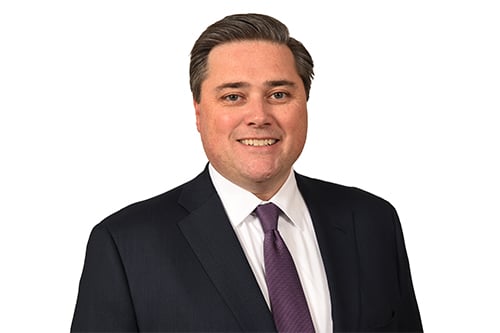

Public sector partnerships involving insurers have been getting a lot of attention recently thanks to the coronavirus pandemic. Notably, Lloyd’s of London CEO John Neal has revealed that Canada’s federal government is in discussions with the marketplace over the establishment of a public-private reinsurance partnership, which would allow the government to protect the economy from future “black swan” events like the COVID-19 pandemic.
However, it’s not the only insurance industry stakeholder dipping its toes into partnerships with governments. In fact, global broking giant Aon had been working with the public sector for years before launching its Public Sector Partnership (PSP) a year ago.
“The creation of the partnership was focused on bringing all of our firm together to support the unique needs of governments as clients,” said Joseph Monaghan (pictured above), CEO of Aon’s PSP. “We really didn’t have a group that was thinking about government holistically as a client and also thinking more creatively about ways that the private and public sectors can come together to create innovative solutions and drive resiliency in the public mission.”
Giving governments all the attention and expertise they deserve is important since their needs are unique compared to other commercial clients. First of all, governments are working with a limited set of budgetary tools to mitigate both increased demand on their resources and the negative impacts to their revenues after a catastrophic event, according to Aon. At the same time, they’re trying to maintain investments in programs that are needed to protect the future health and safety of taxpayers and tax bases.
In light of these challenges, Aon’s PSP team has set out to pinpoint the financial exposure to governments’ catastrophic budgetary scenarios and provide solutions that reduce and transfer that exposure away from taxpayers, thereby promoting fiscal resiliency. The 2020 hurricane season in North America is just one example of the risk posed to governments as they plan for storms amid ongoing attempts to curb the spread of COVID-19.
“There are a lot of projections out there that are calling for a more active hurricane season than normal … at a time where the economy in general is under a lot of stress,” explained Monaghan. After all, nature doesn’t take into account the fact that governments are already fighting on the pandemic front as numbers of confirmed cases continue to climb. The question is then how can governments prepare for this type of ‘double whammy’ scenario?
One way to do that is by bringing in additional financial resources. Before COVID-19 put pressure on budgets, various governments may have had a rainy-day fund offering them some resiliency from catastrophes. Now, those resources have likely been diluted because of everything that governments have had to do to respond to the economic and health emergency created by COVID-19.
In response, Aon’s PSP team has come up with budget insurance solutions where governments can purchase protection for extreme events, such as hurricanes and the wide range of perils that they face. According to Monaghan, these solutions are transparent and pay out quickly, which is particularly important so that governments can start working immediately to get people back on their feet and deploy resources as they see fit.
“They may distribute that to localities [that experience] the most concentrated impact from these events. They may distribute it to businesses that are affected or individuals that are affected,” he explained.
Technology is another important component of the work that Aon is doing in the public sector, namely through its analytical capabilities and modelling. “We rely on our analytics and weather models to really hone in on areas where we see various concentrated exposure,” said Katie Sabo (pictured below), managing director for Aon’s Public Sector Partnership.
Besides the pandemic and hurricanes, governments face a range of other challenges that a partnership with an insurer can help prepare them for. Just like other industries, government employees have had to transition to remote work models and now may be thinking about repositioning talent for the future. Aon has a talent practice that works with governments on that very topic. Cyber is another significant issue, especially with the cyberattacks that have occurred alongside the spread of COVID-19.
“Governments have also been impacted and they want to protect their citizens’ information, just as much as private sector firms want to protect their customers’ information,” said Monaghan. “We’re working with governments on how do they protect their systems, what are the things they need to do to shield all of the valuable information they have from attackers, and then can we mitigate some of that risk with insurance or other solutions.”
As Aon’s PSP continues to work with governments on various risk transfer solutions, its team isn’t just focused on North America.
“We have been spending a lot of time … in the UK, and the member states of the European Union, and Australia,” said Sabo. “This is about truly helping governments think about how they manage and control risk.”
